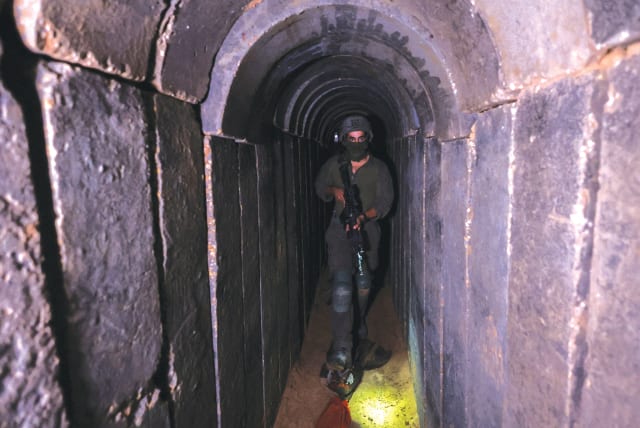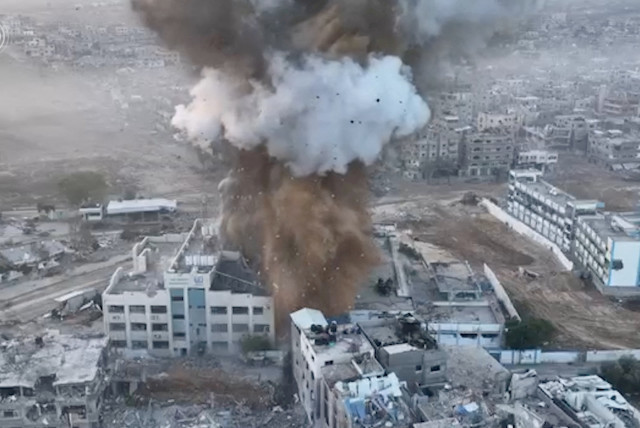Israel must abide by int'l law despite Hamas cynicism - Opinion

According to international law, there are certain instances in which it is permissible to attack hospitals.
The safety of hospitals and medical facilities in Gaza became a central theme during the Israel-Hamas war. As the famous Erich Maria Remarque quote goes, “A hospital alone shows what war is.”
The first controversy came early in the war with the false allegations about the IDF bombing of the Al-Ahli Hospital in Gaza City, an incident that Hamas claimed led to the death of 500 people. Shortly after, it was proved that a failed Hamas rocket had hit the parking lot of the hospital, and, as recognized by Human Rights Watch, the number of casualties was highly exaggerated. Since then, the World Health Organization (WHO) has asserted that 187 medical facilities were impacted by the hostilities, 24 of which are hospitals.
The impact on hospitals and medical facilities usually comes from either deploying fire-power or conducting investigations related to suspected misuse of the hospital by Hamas, and in search of the remaining Israeli hostages in Gaza (the current number, hard to fathom, stands at 136 people).
Israel asserts (and has shown proof) that Hamas uses hospitals for command and control as well as the tunnels below them for sheltering weapons and terrorists, instigating attacks, and detaining Israeli hostages (as shown in footage from Shifa, when illegally kidnapped persons were brought to the hospital). This is a recurring issue between Israel and Hamas, exemplified by Amnesty International’s 2014 findings of evidence of hospital misuse by Hamas during Operation Protective Edge.
Hospitals and medical facilities are sacred under international humanitarian law. The protection of hospitals goes back to early documents such as the 1874 Brussels Declaration, and has been reaffirmed in all meaningful legal instruments adopted since then (notably, the Hague Regulations and the Geneva Conventions). Both sides to the conflict are obligated to safeguard hospitals – Hamas should not misuse them and Israel should not attack them.
Israel should not attack hospitals in Gaza
This protection, however, is not an absolute one. When a hospital is misused it loses protection temporarily, and a party to the conflict can either operate in it or even attack it in order to safeguard its soldiers and to neutralize a possible risk it faces.
We should differentiate between two scenarios. When a hospital is misused by Hamas to hide weapons, or to detain hostages, the IDF has a right to operate and investigate in that hospital. The second scenario is one that involves an actual attack coming from the hospital, namely a direct threat to the lives of the soldiers on the ground (or, in the case of launching rockets at civilians in Israel).
In such a case, according to the International Committee of the Red Cross, the guardian of the Geneva Conventions, the IDF is entitled to attack the source of risk emanating from the hospital. This right is of a temporary nature, and it must conform with other obligations such as those of proportionality and of precautions against attack (namely, warning civilians and medical staff in advance). The fact that medical staff are, at times, revealed as members of Hamas, makes matters even more complicated.
In order to evaluate actions by the IDF, one cannot take a bird’s eye view, rather there is a need to evaluate each and every incident on its own. There needs to be a consideration of evidence presented before the military commander, who evaluates it based on a standard of reasonableness. The IDF will need to show why an investigative operation, or a strike, took place, and thus far it is doing a good job of presenting evidence to the public. The IDF even published an interactive map that includes footage of the misuse of hospitals in Gaza.
The IDF makes strong assertions, especially when it comes to misuse that creates a strategic advantage for Hamas (such as the tunnels), that are currently being accepted by the international community to an extent. But, the real test will be the “day after” the resolution of the hostilities. Until then, we will need to wait for the fog of war to disperse in order to truly pass judgment in this matter.
The writer teaches international law at the Hebrew University of Jerusalem, where he serves as the academic coordinator of the International Law Forum.
Jerusalem Post Store
`; document.getElementById("linkPremium").innerHTML = cont; var divWithLink = document.getElementById("premium-link"); if (divWithLink !== null && divWithLink !== 'undefined') { divWithLink.style.border = "solid 1px #cb0f3e"; divWithLink.style.textAlign = "center"; divWithLink.style.marginBottom = "15px"; divWithLink.style.marginTop = "15px"; divWithLink.style.width = "100%"; divWithLink.style.backgroundColor = "#122952"; divWithLink.style.color = "#ffffff"; divWithLink.style.lineHeight = "1.5"; } } (function (v, i) { });

